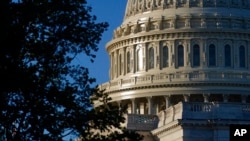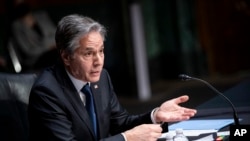U.S. lawmakers of both major political parties are ramping up pressure on the Biden administration to designate Russia a state sponsor of terrorism.
A resolution urging the secretary of state to make the designation has been introduced in the House of Representatives at a time when Congress is eager to punish Moscow for its war on Ukraine.
Sponsored by Republican Rep. Joe Wilson of South Carolina and Democratic Rep. Ted Lieu of California, the resolution seeks to add the Russian Federation to a list that includes North Korea, Iran, Syria and Cuba.
“[Russia’s] reign of terror must stop,” Wilson said in a statement.
Lieu said the state terror designation would further efforts to penalize Russia for its invasion of Ukraine.
“With the designation, the United States would be able to ban dual-use exports to Russia and take economic action against other countries that do business with Russia,” he said in a statement.
On Sunday, Senate Minority Leader Mitch McConnell, a Kentucky Republican, called on President Joe Biden to make the designation. McConnell over the weekend visited Kyiv and met with Ukraine’s president, Volodymyr Zelenskyy.
"I think it's a good idea, and I would support that," he told reporters during a press call, according to The Hill. "The president could do it on his own, and I would urge him to do it."
Ukrainian officials and lawmakers have pleaded with the U.S. to take the step.
"We believe that Russia should be officially recognized as a state sponsor of terrorism," Zelenskyy said during his meeting with McConnell and other members of a Senate delegation, according to his official website.
Maria Zakharova, the spokesperson for the Russian Ministry of Foreign Affairs, called the terrorism designation efforts by U.S. authorities "idiotic measures," to which Russia would respond.
"We, as you know, leave nothing unanswered, and they should understand this," she said April 28, according to a Russian media report.
A few days before McConnell’s trip to Ukraine, then-White House press secretary Jen Psaki was asked to respond to the Senate resolution at the press briefing. She didn’t offer specifics but noted that many of the measures tied to the designation have been implemented since Russia invaded Ukraine.
In addition to a House measure, a bipartisan resolution has been introduced in the U.S. Senate.
"Putin is a terrorist, and one of the most disruptive forces on the planet is Putin's Russia,” said Republican Sen. Lindsey Graham of South Carolina, introducing the resolution last week.
“Putin's Russia deserves this designation," said Sen. Richard Blumenthal, a Connecticut Democrat who co-authored the measure.
State Secretary Antony Blinken appeared open to the possibility when he testified before the Senate late last month.
"There's no doubt in my mind ... that the Russians are terrorizing the Ukrainian people,” Blinken said, according to The Wall Street Journal. “The question is this—and again, this is something that the lawyers are looking at—to make sure that we actually meet the statutory requirements of that designation."
Some members of Congress urged consultations with allies before making the designation.
"I think that Russia's behavior certainly justifies this definition, but much of our strength in responding to Russia's invasion of Ukraine is a joint response with our European allies,” said Democratic Sen. Chris Koons of Delaware, speaking with VOA. “This would almost completely stop any business of any type that would interact with Russia."
According to the State Department, with this designation, Russia would face four types of sanctions: "restrictions on US foreign assistance; a ban on defense exports and sales; certain controls over exports of dual-use items; and miscellaneous financial and other restrictions."
"Adding Russia to the state sponsors of terrorism list would be the nuclear economic option and a precision strike against Putin's ego," wrote Jason M. Blazakis, a professor at the Middlebury Institute of International Studies, writing in The Los Angeles Times. Blazakis was a director of the State Department's Counterterrorism Finance and Designations Office in the Bureau of Counterterrorism from 2008 to 2018.
He explained that the State Department can add a country to the list after establishing "at least two examples of state-supported terrorism."
"We don't have to look far, though, to find another clear-cut example. Even today, Russia provides sanctuary to a U.S.-designated terrorist group, the Russian Imperial Movement, which operates with impunity in Russian territory. It is a group that has trained terrorists to carry out an attack in Sweden, and it has served as a proxy force for Russia in Crimea," wrote Blazakis.
Both resolutions, registered in the House and the Senate, list numerous examples of the activities that can be qualified as state-sponsored terrorism - in Ukraine, Chechnya, Syria, and other countries.
"It is important to use every tool at the disposal of the US and the international community to hold Putin and Russia accountable, said Jonathan Katz, a senior fellow with The German Marshall Fund VOA, in a written response to VOA.
He believes "Russia and Mr. Putin and the actions that have taken in Ukraine and globally fit the criteria, and they should be labeled a state sponsor of terror."
Lithuania is the first country other than Ukraine to recognize Russia as a sponsor of terrorism. On Tuesday, May 10, the country's parliament designated the Russian Federation as a sponsor of terrorism and recognized its actions in Ukraine as genocide.
"If more states recognize Russia's actions as genocide and Russia as a terrorist state, more political will might emerge to expel Russia from all international formats, political, cultural, sports, etc. The countries that still doubt would be encouraged to adopt tougher sanctions, supply more weapons to Ukraine, etc.," said Paulius Saudargas, Deputy Speaker of the Seimas of the Republic of Lithuania in a written response to VOA.
Russian Foreign Ministry spokeswoman Maria Zakharova called the resolution of the Lithuanian parliament an "extremist step," according to the Russian state agency TASS.
Leonid Slutsky, head of the International Affairs Committee of Russia's lower house of parliament, said “the resolution was not legally binding and that it merely repeated what he called the United States' Russophobic views," Reuters reports.
Danila Galperovich of VOA's Russian Service and Kateryna Lisunova of VOA's Ukrainian Service contributed to this report.








